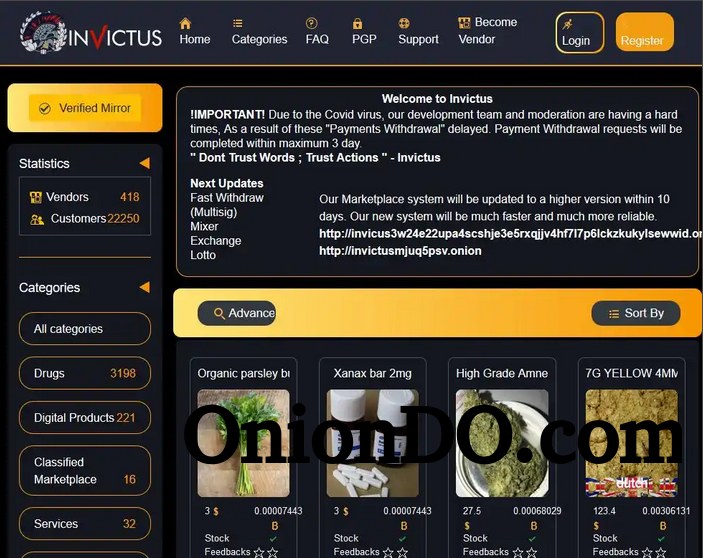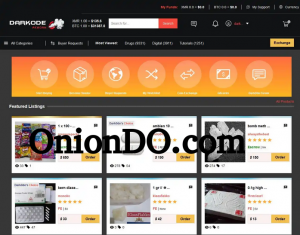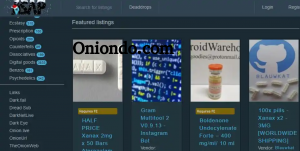Invictus was a short-lived darknet market developed and operated by Imperiya. It began operation in August 2020, and it went down hardly a month later. The site was most likely exit-scammed as no one has heard from them whatsoever. Beyond the infamy of its development team, Invictus Market was by all other measures an unremarkable and traditional, TOR browser-based darknet market.
The Hype
Much had been said about Invictus Market leading up to its debut. According to its developers in a typo-laden announcement, Invictus was going to be the #1 darknet market service as it had been built by their team, Imperiya. They banked the inevitable success of Invictus on their previous Imperiya Vendor Shop Program, while making platitudes about their ability to “evolve” and “adapt” to overcome any circumstances.
Rather than devote much of their announcement to talk up any of the actual features of Invictus, Imperiya mentioned the aesthetics and usability of its UI instead. They then went on to claim the Invictus Market would be “the beginning of a new era” with no technical details to substantiate such a claim. It’s not certain what Imperiya meant when they called Invictus the first investor-owned market, nor how they intended to decentralize marketplaces through community ownership.
The entire announcement is vague, offering little insight. In hindsight, Invictus Market’s developers’ bold claims were nothing more than a bid to rope in as many unwittingly eager users as they could before cutting and running.
Design and Functionality
Invictus Market’s design was very familiar, if not standard, for darknet markets. The overall user interface was functional and sleek but without any innovation. Users reported a few notable glitches when using the site, mostly related to browser window scaling.
The darknet market featured the standard layout of a top bar where account options were nestled, categories all off to a bar on the left-hand side of the page offering mostly illicit drugs like ecstasy/MDMA, cocaine, etc. There was an advanced search function and the ability to sort products and services listed by relevance, date posted, price, etc.
Reportedly, despite being primarily designed for use on PC, Invictus Market worked on mobile devices and was easy to use on smartphones for placing orders, although, if the deepweb site’s FAQs are anything to go by, using the site on mobile devices wasn’t 100% reliable as the market page would occasionally go blank when viewed on a mobile device.
Features
In the brief window of its operations, Invictus Market was allegedly a feature-rich for a darknet market. IT came with all the industry-standard features alongside accepting three different cryptocurrencies, namely: Bitcoin, Monero, and Litecoin. The reason for this is obvious now.
Regardless, users were able to deposit all three cryptocurrencies into a site-bound wallet. When it launched, The site lacked any multisig authorization, but Imperiya claimed that multisig was in the process of implementation. Other security risks were prevalent throughout the site’s features as well; it had a built-in PGP tool which likely further compromised users’ security.
All purchases had to be done through escrow unless purchased from Finalise Early (FE) vendors that had proven themselves reliable and reputable; although given the limited lifespan of the market, it’s unlikely any vendors ever attained FE status.
Invictus Market LINK:
http://invictvevpwxlcrbjktr5sxpqpwtk6lel7vppagvtgxtewa3da5hoqad.onion/
Conclusion
Invictus is defunct; it posed a significant security risk for its users, and after barely a month of operations, its fraudulent development team most likely exit-scammed its vendors and buyers after having hyped the site as a revolutionary new darknet market. It now stands as a reminder to be wary of dubious, unsubstantiated claims on the darkweb, even those made by reputed sources.




No comments! Be the first commenter?